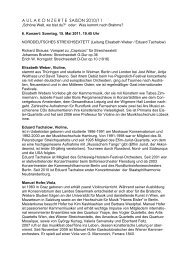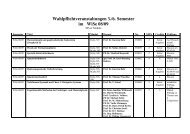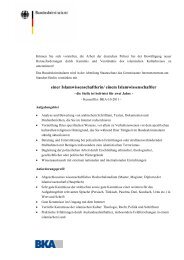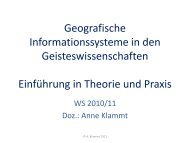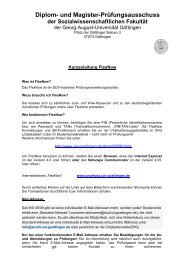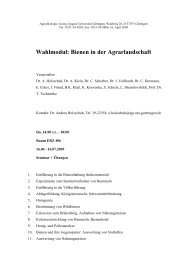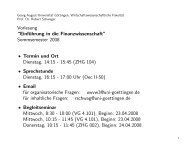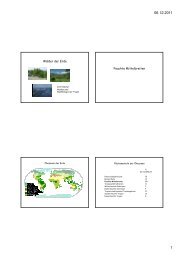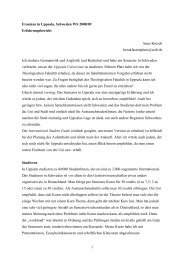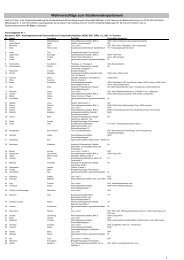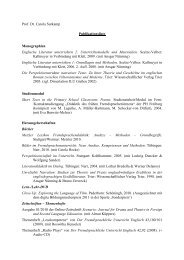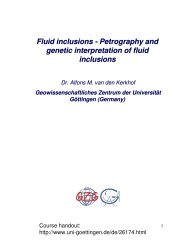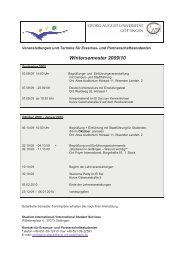The OMC inclusion and national social NGOs: From enthusiasm to ...
The OMC inclusion and national social NGOs: From enthusiasm to ...
The OMC inclusion and national social NGOs: From enthusiasm to ...
You also want an ePaper? Increase the reach of your titles
YUMPU automatically turns print PDFs into web optimized ePapers that Google loves.
in order <strong>to</strong> Europeanise <strong>national</strong> <strong>social</strong> policy debates was more than limited, resulting in lowinvestments in terms of mobilisation 37 ; <strong>and</strong> in occupying officials with no policy-makingpower with the <strong>OMC</strong> (Miebach 2004: 41; Scharpf 2002: 654) who don’t really read thereports nor have the time <strong>to</strong> discuss them; in lack of adequate information, transparency <strong>and</strong>public visibility as well as in the absence of additional resourcing. This is particularly wondersome for the French case where little would have needed <strong>to</strong> be done in order <strong>to</strong> at leastsynchronize the existing <strong>national</strong> debates with the European agenda.Finally, the external, EU-related reasons for the poor delivery must be addressed. Looking atthe <strong>to</strong>ol box of the <strong>OMC</strong> <strong>inclusion</strong> at EU level <strong>and</strong> its embeddedness is essential whenseeking <strong>to</strong> underst<strong>and</strong> its limited impact on <strong>national</strong> policy-making in general <strong>and</strong> on <strong>social</strong><strong>NGOs</strong> in particular. With respect <strong>to</strong> the latter, it seems useful <strong>to</strong> recall that the <strong>OMC</strong>(<strong>inclusion</strong>) is an intergovernmental instrument meaning that its implementation is <strong>to</strong>tally left<strong>to</strong> governments’ ambitions. As long as its objectives, amongst which the goal <strong>to</strong> mobilise allrelevant ac<strong>to</strong>rs, follow a voluntarist logic, this <strong>OMC</strong> “does little <strong>to</strong> empower <strong>NGOs</strong> vis-à-visstate interests” (Edquist 2006: 502) <strong>and</strong> does not change the traditional channels of policymakingwhich offer few opportunities <strong>to</strong> get engaged <strong>and</strong> influence the policy process(Warleigh 2001). Second, the traditional “ally” of <strong>NGOs</strong>, the Commission, has a rather weakposition in this process <strong>and</strong> therefore is not in the position <strong>to</strong> significantly support NGO’sinterests. It can also be debated if the traditional support by the Commission has beenuniversal (goal: more effectiveness <strong>and</strong> legitimacy) or particularistic (goal: increase power ofCommission by seeking external support for an initiative or an argument). Finally <strong>and</strong> notleast importantly, EU <strong>social</strong> policy, in particular since the revision of the Lisbon Strategy in2005, has become even more centred on employment <strong>and</strong> competitiveness, leaving less spacefor the more encompassing approach of combating <strong>social</strong> exclusion that <strong>social</strong> <strong>NGOs</strong>generally defend. If they nevertheless get involved with the <strong>OMC</strong> <strong>inclusion</strong>, this cansubsequently incorporate the risk of dis<strong>to</strong>rtion of their policy position or cooptation (Edquist2006). If <strong>NGOs</strong> choose <strong>to</strong> hang on <strong>to</strong> their philosophy <strong>and</strong> their role as a critical voice, thenthey risk <strong>to</strong> the contrary not being in line with the funding dem<strong>and</strong>s of the Commission(which include strategic policy choices) <strong>and</strong> therefore being excluded from importantresources (Halvorsen <strong>and</strong> Johansson 2005).37 One German key officer stated that the little amount of consultation was mainly due <strong>to</strong> the Commission forwhom the mobilisation of all relevant ac<strong>to</strong>rs was an important issue. Without that, so its conclusion, there wouldhave been no consultation at all – as mostly happened for the first NAPs (2001-2003).



